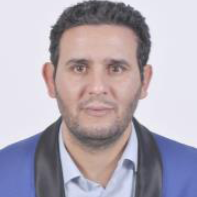
Azeddine Benelrhali
Work place: ESMAR, Department of Physics, Faculty of Sciences, Mohammed V University, Rabat, Morocco
E-mail: azeddine_benelrhali@um5.ac.ma
Website: https://orcid.org/0000-0002-2769-0051
Research Interests:
Biography
Azeddine Benelrhali is a Computer Science teacher at Al-Khwarizmi High School in the Regional Academy of Marrakech-Safi, Morocco. He holds a master‘s (MA) degree in High Energy Physics, Astronomy, and Computational Physics (PHEAPC) from the Faculty of Sciences, Semlalia, at UCA, Marrakech, Morocco. Currently, he is a PhD candidate at Mohammed V University.Benelrhali is a member of the Centre of Excellence, created by the Samsung Innovation Academy and the Regional Academy of Marrakech-Safi, focusing on advanced programming and robotics. He has also been involved in various programming-related activities with the GENIE Group. Benelrhali‘s research focuses on computer science, information and communication technology (ICT), coding,computational thinking (CT), educational robotics (ER), science, technology, engineering, and mathematics (STEM), as well as artificial intelligence (AI) within the TransERIE research group at UCA. As the leader of the CTOOL project (Computational Thinking at School).He aims to integrate computational thinking and langage programming into the school environment through the use of open educational resources (OER), promoting innovative teaching methods across disciplines to enhance students' problem-solving skills and exploring the role of AI in education within the Moroccan context, investigating how machines can accomplish tasks that learners or teachers cannot.
Author Articles
Exploring AI Tools and Large Language Models for Students' Performance Enhancement in Riddle Based Logical Reasoning
By Azeddine Benelrhali Khalid Berrada
DOI: https://doi.org/10.5815/ijmecs.2025.05.01, Pub. Date: 8 Oct. 2025
In the era of Artificial Intelligence (AI), where technology is transforming industries, education stands at a pivotal juncture. With an increasing emphasis on critical thinking and problem-solving, there is a growing need for innovative tools that can foster these essential skills among students. Traditional education methods need help making personalized scalable and interesting experiences for students at this task type which this research aims to solve. The research uses AI and deep learning tools to build an effective framework that enables better riddle solving for students by proposing state of the art deep features including sentence embeddings and ULMfit to be applied as input to deep learning models. In contrast, this study examines different traditional machine learning and deep learning models including ensemble learning models, used as baseline models for comparing the performance of the proposed transformer architectures based on RoBERTa-Large to determine which approach works best, achieving highest accuracy of 96% to effectively handle riddle complexity. The research studies used text data patterns using TF-IDF, Count Vectorization, and word embedding techniques which apply in the form of Roberta. Our research findings help educators, technology experts and scientific teams design educational tools with an easy-to-deploy AI solution.
[...] Read more.Other Articles
Subscribe to receive issue release notifications and newsletters from MECS Press journals